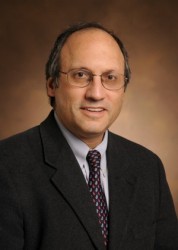
Jeffrey Sosman, professor of medicine at Vanderbilt-Ingram Cancer Center (VICC), has been named to a melanoma research Dream Team of cancer investigators supported by Stand Up To Cancer (SU2C) and the Melanoma Research Alliance.
Sosman is among the Dream Team’s principal investigators who will work closely to write the genomic-driven clinical trials and will lead one of several research sites that will enroll melanoma patients in clinical trials. These trials will identify molecular mutations that are unique to each patient’s tumor and match the molecular characteristics to specific investigational drugs targeting these abnormalities.
Melanoma, the most dangerous type of skin cancer, is the fifth most common cancer diagnosed in the United States, where one person dies from the disease every hour.
“I am excited about the opportunity to join my colleagues at other leading cancer research institutions as we try to develop more personalized therapies for melanoma patients,” said Sosman, who is an Ingram Professor of Cancer Research.
Currently, patients who develop metastatic melanoma have a dismal prognosis, with a median survival of six to nine months and a five-year survival rate of 15 percent to 20 percent. About half of patients with metastatic melanoma have an oncogenic mutation in their tumor’s BRAF gene, but the other half are BRAF wild type (BRAFwt) and have no mutation. While a new drug has been approved to treat patients with the BRAF mutation, very little progress has been made to identify new therapeutic targets to treat patients with BRAFwt metastatic melanoma.
Dream Team to develop better melanoma treatment
Dream Team members will molecularly profile BRAFwt melanoma tumors and test for sensitivity to hundreds of compounds that may have therapeutic potential. Researchers will use these data to generate models that predict the sensitivity of BRAFwt melanomas to specific drugs.
An ensuing clinical trial will determine whether this personalized approach significantly improves patient response and survival. The goal is a 30 percent improvement in tumor response compared to standard-of-care therapy.
“Having a Dream Team of physicians and scientists focus on such an important and unmet need for patients who are not able to benefit from the latest breakthrough drugs is a most welcome development,” said Debra Black, co-founder and chair of the Melanoma Research Alliance.
“Combining resources to compete against this disease and accelerating the pace of cancer research are twin pillars of the Stand Up To Cancer approach, and we were delighted to work with the Melanoma Research Alliance on our first grant made in collaboration with another foundation,” said Sherry Lansing, a 30-year veteran of the motion picture industry and one of Stand Up To Cancer’s co-founders.
The SU2C-MRA Melanoma Dream Team Translational Cancer Research Grant provides $6 million during a three-year period.
In addition to Vanderbilt, Dream Team members come from the following institutions: Translational Genomic Research Institute, Karmanos Cancer Institute, Mayo Clinic, Michigan State University College of Human Medicine, Scripps Research Institute & Scripps Health, Van Andel Research Institute, Sanford-Burnham Medical Research Institute, Memorial Sloan-Kettering Cancer Center, Arizona State University, Johns Hopkins University, National Cancer Institute, Queensland Institute for Medical Research, and University of California Santa Cruz.
Jeffrey Sosman is the second VICC researcher named to one of the SU2C Dream Teams. Carlos L. Arteaga, director of the Breast Cancer Program, is a member of a breast cancer Dream Team targeting the PI3K molecular pathway in women’s cancers.
William Pao, director of Personalized Cancer Medicine and the Division of Hematology and Oncology at VICC, has been awarded an Innovative Research Grant from SU2C.
SU2C has previously funded five Dream Teams comprised of 221 scientists at 43 institutions, and has awarded Innovative Research Grants to 26 individual young investigators pursuing high-risk, high-reward research projects unlikely to be funded by traditional sources.